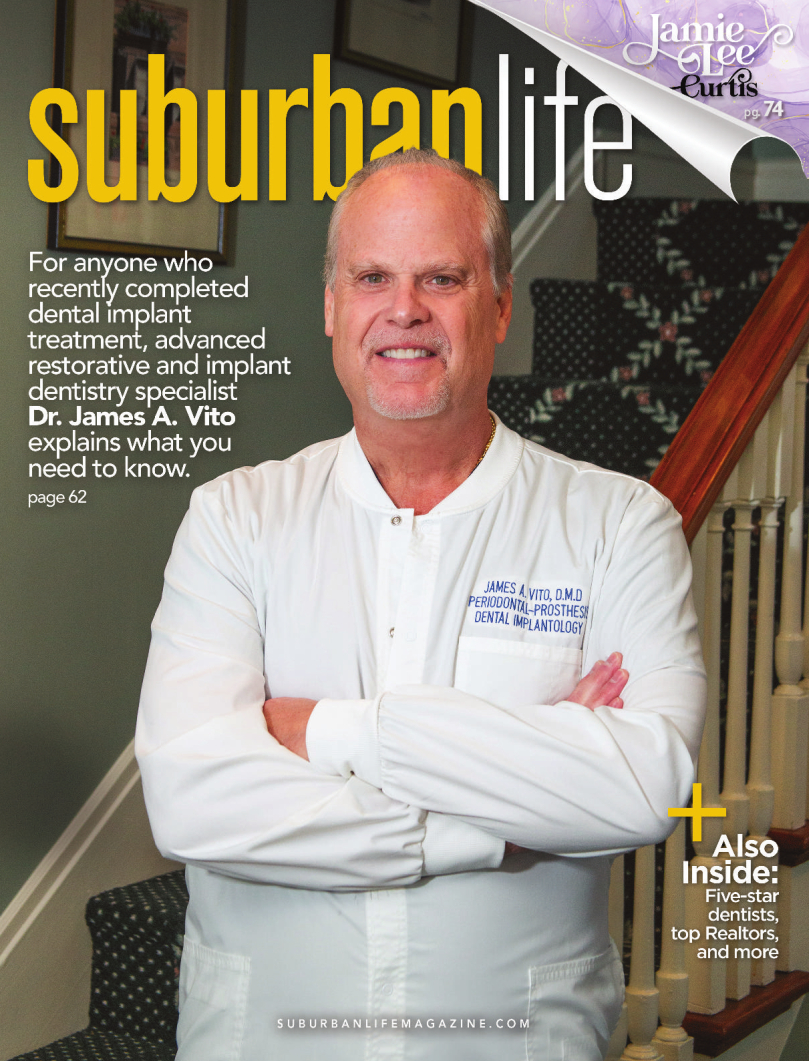If you recently completed dental implant treatment, here’s what you need to know.
by James A. Vito, D.M.D.
For those of you who have dental implants, you know it is a time-consuming and expensive proposition. It also represents some of the most sophisticated dentistry that we as dentists have to offer, especially if we have to repair or recreate bone prior to the surgical placement of dental implants. Therefore, the care and maintenance of your dental implant(s) and dental implant restoration becomes paramount for their long-term success and durability, as well as protecting your investment of both time and money.
Patients lose teeth for one of several reasons: congenital issues in which you are born without specific teeth; periodontal (gum) disease, where you lose extensive amounts of bone support; trauma, where you have a tooth or several teeth knock out; endodontic failure, where the original infection is not resolved by root-canal treatment; and extensive dental decay, where the tooth cannot be saved and needs to be removed.
The most common causes of missing teeth are periodontal disease and extensive dental decay. This is due to excessive plaque buildup, which is usually due to poor oral hygiene.
The average lifespan of a dental implant is anywhere from 10 to 30 years. This means that, depending on your age when you get an implant, it should last for the rest of your life. No other tooth-replacement option has the ability to last this long. In order for this to happen, however, you have to do your part.
Therefore, for dental implants to be successful at any age meticulous oral hygiene must be practiced. If not, then the overall success and esthetics of your dental implant(s) and restoration will be compromised.
There are two dental implant infections that threaten the success and aesthetics of your dental implant and restoration.
* Peri-mucositis is a condition characterized by the inflammation of soft tissue around a dental implant. It is an early form of peri-implant disease that has not progressed to the point of losing soft tissue or bone at the implant site. The most common cause of peri-implant mucositis is plaque buildup at the implant site, which harbors toxin-emitting bacteria that result in irritation of the surrounding gum tissue. If left untreated, this situation will lead to the next stage, which is peri-implantitis.
* Peri-implantitis is a destructive inflammatory process affecting both the soft and hard tissues surrounding dental implants. The soft tissue becomes inflamed and results in the progressive loss of the alveolar bone (hard tissue) that surrounds the implant and holds the implant in place. Symptoms of peri-implantitis involve inflammation of both the soft and hard tissues. There is usually evidence of bone loss (assessed by a radiograph), bleeding gums, and, in more advanced cases, suppuration when nearby tissues are probed. The successful treatment of peri-implantitis usually requires surgical intervention or implant removal.
What is going to create problems for your dental implants?
* Poor plaque control. This highlights the importance of cleaning the tissues around an implant between dental appointments. If you feel discomfort while brushing around the implant(s), you are advised to speak to your dentist about this as soon as possible. Also, patients may sometimes be unable to access some sites for cleaning. This needs to be addressed by the dentist as well as by the dental lab responsible for the restoration. If you cannot clean your dental implant restoration properly, then it is a question of when, not if, you will have a problem.
* Lack of regular maintenance therapy. Regular dental visits should be arranged to enable early detection and management of problems. Once you have a dental implant restoration, you need to be seen every three months for a routine hygiene visit and inspection of your implants, and more frequently if you are having trouble minimizing the plaque around your implant restoration. A hygiene visit is the best value in a dental office.
* Corrosion of the dental implant surface. Gum inflammation will create an inflammatory environment that results in the corrosion of the dental implant surface.
This will bring about the release of titanium implant degradation products in the form of microparticles, which have been shown to infiltrate the peri-implant tissue and peri-implant bacterial plaque. These particles have occasionally been found in small concentrations in healthy peri-implant tissue; however, their concentration was reported to be significantly higher in individuals with peri-implantitis. These titanium particles are internalized by phagocytes, and have been found to elicit strong pro-inflammatory effects and bone resorption (loss) in preclinical models, suggesting causative implications to peri-implantitis that will result in bone loss and possible implant loss.
What will help in the successful maintenance of your dental implants?
* An electric toothbrush. This will clean your teeth/implants better than a manual brush.
* Flossing. Have your dentist show you the X-ray of your implant restoration and how the floss needs to reach the location where the implant and crown connect.
* Oral irrigators such as Waterpik. These are very useful in situations where you have multiple implants connected together with a bridge or a complete tooth hybrid bridge, or if you don’t like to floss.
* Hygiene maintenance every three months. This is a nonnegotiable requirement. If you cannot commit to this then your implants will have problems.
These four requirements should be reviewed with you during and following your implant treatment. The better you are at maintaining the overall health of your mouth, the fewer problems you will have with your dental implants and restoration.
About Dr. Vito
Dr. James A. Vito has been practicing advanced restorative and implant dentistry since 1987. He holds advanced degrees in Periodontics and Fixed Prosthodontics from the University of Pennsylvania School of Dental Medicine. He is also board certified in the surgical placement and restoration of dental implants by both the International Congress of Oral Implantologists and the American Board of Oral Implantology.
James A. Vito, D.M.D., DICOI, DABOI
523 E. Lancaster Ave
Wayne, PA 19087
(610) 971-2590
www.jamesvito.com
Photo by Alison Dunlap
Published (and copyrighted) in Suburban Life, September 2023.




